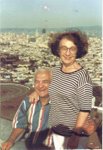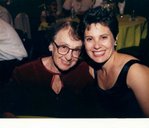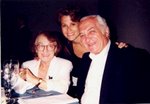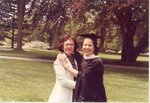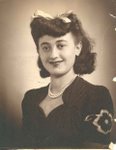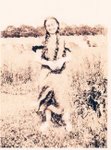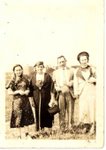(These are Rabbi Marans' remarks from the funeral service on February 12, 2007, painstakingly transcribed by Manny Sarfaty.)
Rabbi Marans began the Service by reading selected passages from the scriptures in Hebrew. Then, he spoke in English as follows:We begin with the 40th chapter of the prophecy of Isaiah:
A voice says, “Cry out”.
And I say what shall I cry.
All flesh is grass,
And all its beauty is like the flower of the field.
The grass withers and the flower fades
When a wind of the Lord blows upon it.
Surely, we people are but grass.
The grass withers and the flower fades
But the word, everlasting of God,
shall endure forever and forever.
And the beautiful 23rd psalm of the psalms of David, the psalm of salvation, of hope:
The Lord is my shepherd; I shall not want.
He maketh me to lie down in green pastures:
He leadeth me besides the still waters.
He restoreth my soul:
He guideth me in straight path for His namesake.
Yea, tho I walk through the valley of the shadow of death,
I will fear no evil: For thou art with me.
Thy rod and thy staff, they comfort me.
Thou preparest a table before me in the presence of mine enemies;
Thou hast annointest my head with oil; my cup runneth over.
Surely goodness and mercy shall follow me all the days of my life,
And I shall dwell in the house of the Lord for lengths of days.
And the reading from Ben Sera from Ecclesiasticus, written 2000 years ago, a letter from a parent to her child:
My dear child - fear not death; we are destined to die.
We share it with all whoever lived, with all whoever will be.
Beware of the dead, yes, and hide not your grief.
And do not restrain your mourning,
But remember that continuing sorrow is worse than death.
And so when the dead are at rest,
Let their memory rest.
And be consoled when the soul departs,
Because death is better than the life of pain
And eternal rest - that constant sickness.
My dear child,
Seek not to understand what is too difficult for you,
And search not from what is hidden from you,
And be not over-occupied with what is beyond you,
For in life you are shone much more
than you can possibly understand.
And so a drop of water in
the sea and a grain of sand on the shore
Are man’s few days in eternity.
The good things in life last for limited days
But a good name is remembered and endures forever.
And we pray,
All mighty God, Lord of the living and of the dead, the hearts of these, your children, who mourn are heavy with grief. Give them comfort. They are overcome by pain and tears.Help them to remember the triumph and the joy in the life of Pearl Sarfaty – Perla Bat Chiel.
They are overwhelmed by loss, O Lord, and help them to treasure what is theirs because she lived; and help them to meet grief with courage; to confront the angel of death only with ongoing and continuing life; for when despair threatens and our faith falters sustain us all, O Lord, and be our refuge and our strength and our ever-present help.
And so my dearly beloved we have come together, in a most holy convocation,
joining together as a family in bereavement to share their sorrow and help them bid a sad farewell to their wife and mother, mother-in-law, grandmother, relative and friend.
To recall collectively the blessings of her life and to thank God for all that was good and true in her life and most especially for the precious memories that linger and will endure.
Eternal God, Creator, merciful father of all, your children bowed in grief. Seek light to help them dispel the dark gloom that threatens to overwhelm them. Be gracious to those who mourn for they are in distress. Bless this family with compassion. May they find love in each other and with each other. May their burden of sorrow be eased and send them of your radiant light and give them peace. And we offer these condolences to Pearl’s beloved husband, Emanuel,
to his daughter, Ruth Joy, and Jeffrey Miller and to their children, Hannah and Matthew. To recall the memory of Pearl’s sister, Ruth, and to all of the members of the family find strength where you will be helped. For God is our sustaining power forever.
It has often been said that a eulogy is a most unfair dissertation. It’s a composition that’s written and declared with declamation at a funeral exercise; and it’s unfair because it’s supposed to summarize the life of a human being. And the life of a human being that’s lived more than eight decades cannot possibly be summarized in the few short moments - an epitaph of a paragraph or two of words.
And so the unfairness of this opportunity gives us a sense of reaching out and recalling and stroking our memory of the many, many talents the human condition possesses; perhaps remembrance is its most noble and most subtle.
To be able to turn off memories of gladsome tidings, of merriment, and memories of tragedy makes life, at times, bearable and unbearable; so we are called upon by our Rabbis in their injunctions as to how to behave in the time of death to recall the celebration of life so that they will be inscribed indelibly on our hearts and in our minds of how unique each individual is amongst the many billions and how special Pearl Sarfaty was to her family and friends.
And so are calling upon members of the family who will express their remembrances, who will light a candle from this pulpit so that we might carry its remembrance as a clarion call and as a lamp.
And hope and pray the memory of Pearl Sarfaty will not be easily forgotten.
I never had the privilege of meeting Pearl but I knew a lot about Pearl.
Manny and I both have cardiac issues.
When I met Manny four years ago at the Cardia Care clinic on Central Avenue,
he recognized me because he had come to the Synagogue of the Sephardic Temple.
He introduced himself and said I am the son of Rabbi Sarfaty and I assumed that he was walking in his father’s footsteps.
It was the first of many assumptions that did not manifest themselves.
I got to know Pearl through Manny – about her love for Yiddish music, her reading, her kindness, her sociology career, her teaching career; but more than that I got to know the make-up, the talents, the characteristics of Manny - Emanuel Sarfaty.
We found ourselves always on adjacent treadmills. The purpose of a treadmill is to get your heart beating fast so the heart muscle should improve. And after one or two discussions I found in Manny the best therapy for heart stimulation.
And so every Monday, Wednesday and Friday, weather permitting, my blood pressure would start high and then go low.
Let me give you one or two examples:
About a month ago when President Bush’s rating was down low and Manny was very, very happy I said to him, Manny, it’s not going to help you because in the Torah it says the bush will not be consumed.
That kept him going for another two weeks.
And just last week I saw he was a little despondent and I began my exercise on the treadmill I said Manny I have decided who I am gong to vote for, it’s going to be Guiliani twice.
And he looked at me and said it can’t be. You’re a nice Jewish boy. You are for the Torah, etc.
And this is what I learned from Manny and I think Manny’s characteristics and talents were fashioned and forged by his wife who brought to their marriage the great and beautiful traditions of Ashkenazi Jewry; a much more cerebral tradition; a tradition of being active in social justice; a tradition of helping mankind; a tradition of always looking at the forlorn and to find out if they need help; And that made for a very beautiful marriage and a beautiful relationship.
There was a poem written in the Victorian period:
God looked down around his garden and found an empty place.A Jew once asked his Rabbi what is the meaning of the tradition in the synagogue that was very prevalent in the old country that on Rosh Hashanah and Kippur that Jews would cry during their prayers, “who shall live and who shall die”, and there was a sense of wailing, often in the congregation.
He then looked down upon the earth and saw your tired face.
He put his arms around you and lifted you to rest.
God’s garden must be beautiful; He always takes the best.
He knew that you had suffered; He knew that you were in pain.
He knew that you would never get well on this earth again.
He saw the road was getting rougher and rougher
and the hills were getting harder to climb.
So God came down to close your weary eyelids and
whispered Shalom, peace be thine.
It broke our hearts to lose you
but you didn’t go alone,
For part of us went with you the day God called you home.
What is there to cry about?
If man had been fashioned from gold and was then in his life reduced to dust
it would be something to cry about.
The bible tells us man is created from dust.
But if he returns to the original substance of which he had been made
God is fair. He gives us a life. Why should people cry?
And this life the Rabbi answered,
(Perhaps even in the spirit of your father.)
I quote this from the good books –
The man comes from dust and returns to dust.
Between the two terminalpoints of birth and of death,
he is expected to raise himself to the highest
level of mind and of heart and of soul of which he is capable.
If he doesn't do this and if his life is one long wasteland,
then there is reason to cry.
In recalling Pearl’s life, it was the opposite of a long wasteland.
Coming from abroad, a new culture, a new language, maintaining the dignity and compassion;
maintaining all of the acts of tenderness, and of solicitude, and of gratitude; a great emotion of feeling; she grew up with the beautiful aristocratic characteristics of East European Jewry and planted them in our wonderful America. America that seemed to shy away from this kindness and this adoration of love, of graciousness and of caring; and she gave to Manny, and gave to her daughter, and her grandchildren and son-in-law a dimension of understanding life that is not taught in the universities; it’s not found in the marketplace; it’s not street smarts but it’s what I would like to call the spiritual genes of the truly Jewish family.
And you’ve walked with this, with the garland on your crown,
Of flowers, and of blessings, and of beauty and of warmth.
But alas God has chosen. He who gives takes.
We receive life. We pay no deposit for it.
Our parents pay no fees to the Kadosh Baruchu.
And of blessing and of beauty and of warmth.
God is a gift. For he gives us gifts. And God who gives gifts has the right to take his gifts. And so at this moment there has to be anguish.
The torah tells us:
He, whose lifetime does his wife die. It is as if the temple was destroyed in his lifetime. That didn’t mean the end of the Jewish people. The temple was the house of holiness. The temple was the meeting place. The temple was the home. Manny, your home has been taken away from you but your life has not been destroyed. You have the vigor. You have the love of a beautiful daughter and grandchildren and son-in-law – brothers, sisters. You have the determination and the will to continue the glorious years that you had with your wife. And you’ll find that space. You have moments of reflection.
It was Albert Einstein who said the following:
There are three ways to mourn.
The first is to cry, which you’ve done.
You’ve been crying a long time.
The second is to grow silent. When you saw
terminality set in.
The third is the challenge and that is to transform
sorrow into song.
Professor Heshel quotes Einstein in his book on Mourning and Consolation.
Another poem:
If I should ever suddenly leave you,
your wife is singing, of whom I love,
To go along the silent way, grieve not.
You’ll speak of me with tears
but laugh and talk of me as if I were beside you there.

